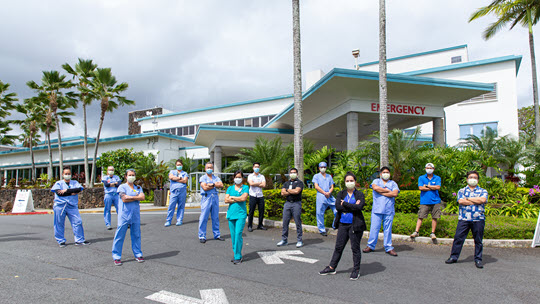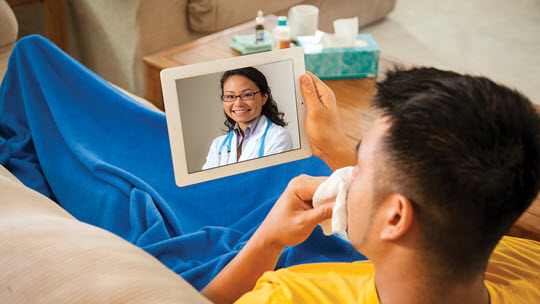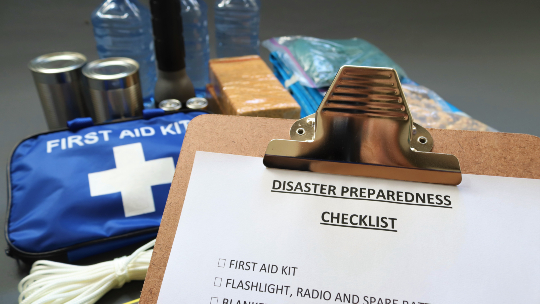At the start of the COVID-19 outbreak, Hawaii doctors say some of their patients were nervous about coming in for care. Since then, hospitals, clinics, and doctors’ offices have made modifications to protect the health and safety of their patients and staff.

Adventist Health Castle associates work together to support patients and the community. Photo courtesy of Adventist Health Castle.
Adventist Health Castle is a full-service medical center that runs a hospital, primary care offices, and clinics where people can receive in-person care. In addition to offering virtual care options, they’ve made the following changes to make patient care as safe as possible:
- Everyone who works for or visits Castle locations is screened with a temperature check and health and travel questions.
- The center's environmental services team is frequently sanitizing and thoroughly cleaning rooms, patient care areas, and high-touch areas. Plexiglas is also used in high-touch areas to help prevent the spread of germs.
- In waiting rooms, the center uses stickers on chairs to distance patients.
- “Everyone is required to wear a mask when they’re in the facility. If you’re a visitor, you’re allowed to use a cloth mask. But if you’re a physician or staff member, you must wear a procedural mask and eye protection,” says Ryan Ashlock, operations executive at Adventist Health Castle. The Centers for Disease Control and Prevention recommend eye protection as a prevention and control practice.
- Hospital patients are allowed one visitor per day. “We’re also asking our patients on our inpatient (hospital) floors to mask as appropriate and as their condition allows to help ensure their interactions with their caregivers are safe,” Ashlock says.
- The center has also made changes for their staff. At the hospital, only one person is allowed in their break room or at bistro tables at a time. They’ve created spaces outside to offer additional space for breaks and eating at a distance.
Telehealth is a safe, valuable option that helps you communicate with your doctor from your home or office. Talk to your doctor about the telehealth platform that’s best for you. An option for telehealth if you don’t have a doctor or need care for minor illnesses or injuries is HMSA’s Online Care®. Online Care providers can help with chronic and acute (sudden) conditions and prescribe medications as needed. Members can also use Online Care to talk to a specialist about their mental health.

HMSA's Online Care doctors can help with your physical and mental health.
While navigating the health care system can be stressful, your doctor can help you make the best decisions for your needs.
“If you have any medical questions or concerns, start by giving your doctor’s office a call,” says Robin Matsukawa, M.D., an Adventist Health Castle doctor. “Don’t be your own doctor. Communicate with the office, tell them your symptoms, and they can help you decide whether to come in to the office or do virtual care,” he says. The doctor may also be able to manage your health concern over the phone.
The bottom line? Keep your doctor informed, especially before canceling appointments. “For safety’s sake, at least give the office a call. Remember that all health care providers are here with you. We’re here for you. Together, we’ll overcome this COVID-19 outbreak,” Matsukawa says.
Amwell® is an independent company providing hosting and software services for HMSA’s Online Care platform on behalf of HMSA.




